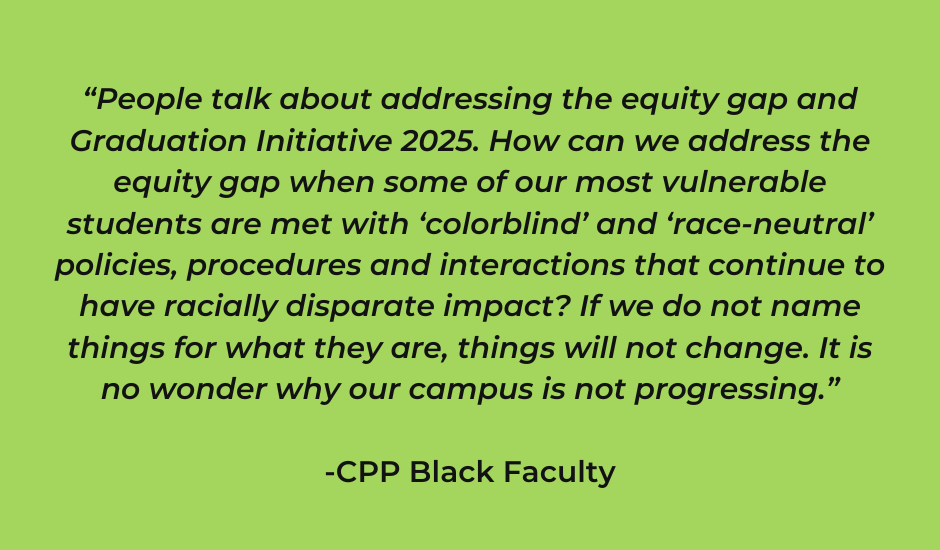What the Data Tells Us
In Their Words...
2022 Assessment
“The moment we choose to love, we begin to move against domination, against oppression. The moment we choose to love, we begin to move towards freedom, to act in ways that liberate ourselves and others. That action is the testimony of love as the practice of freedom.”
~bell hooks~
The experiences of Black students, staff, and faculty at Cal Poly Pomona were captured in summer 2022 through a comprehensive assessment. Explore key data below and download the full assessment reports.
Student Assessment Highlights
Faculty/Staff Assessment Highlights
Full Assessment Highlights and Reports
A report on affirming Black students to achieve student and campus success. Marcus Anthony Brock.
11 domains which were identified in academic literature as factors that contribute to the overall wellbeing and career satisfaction of Black/African American people were assessed throughout the assessment. Out of the 11 domains, 8 areas emerged as areas in need of intervention for the Black faculty and staff community at Cal Poly Pomona.
• Students consistently reported that their ability to remain hopeful is constantly challenged by their experiences with the administration. Students indicated frustration with the lack of consistency and follow- through of institutional efforts and noted that they have had to learn to temper their expectations to combat disappointment and hopelessness.
• The major points of contention were the lack of safe and responsive spaces to have honest dialogue about their frustrations, coupled with insufficient follow- up. Students are feeling the effects of systemic injustices but appear to lack structured and guided spaces to safely discuss and process resultant emotions.
• Students shared concerns about Black issues being minimized and subsumed under the more general label of “POC” or “diversity” issues.
• An astounding 95% of students reported microinvalidations are either somewhat or extremely likely to occur on campus. Microinvalidations are a type of microaggression that seeks to exclude or invalidate a person’s thoughts, feelings, or existence.
• 87% of students endorsed a perceived lack of representation and feelings of tokenization.
• 87% of students indicated they do not feel Cal Poly Pomona is a safe space to show up as their authentic selves, without fears of repercussion. The participants expressed that they are constantly mindful of the ways in which they present and interact with non-Black peers as well as with the faculty and staff. They fear being judged and/or labeled as angry.
- 11 domains which were identified in academic literature as factors that contribute to the overall wellbeing and career satisfaction of Black/African American people were assessed throughout the assessment. Out of the 11 domains, all 11 areas emerged as areas in need of intervention for the Black faculty and staff community at Cal Poly Pomona.
- Black faculty/staff feel that their concerns are either overlooked completely or subsumed under broader diversity initiatives that fail to address anti-Black racism issues specifically.
- 80% of Black employees reported microassaults to be somewhat or extremely likely to occur on the campus. Microassaults are a specific type of microaggression (the most overt type) that reflect conscious attitudes of the perpetrator where biased feelings, beliefs or behaviors are knowingly communicated through external cues, comments, or behaviors.
- A perceived lack of a critical mass of Black people creates a psychological burden by othering your faculty/staff. The sentiment was strong in this area, with 91% of attendees endorsing a perceived lack of representation and feelings of tokenization.
- 75% of participants somewhat, or strongly related to scenarios of hitting a glass ceiling when it comes to securing the necessary support and connections to advance their career and professional goals.
- 60% of participants could either relate or strongly relate to feelings of both invisibility and hyper-visibility. Visibility refers to a person’s perception of their significance within the institution. Often Black faculty/staff find themselves feeling either completely invisible because of their race or hyper visible because of their race. The former leads to beliefs that they will be overlooked for opportunities for advancement or their academic accomplishments, and the latter leads to beliefs that they will be constantly called upon to serve as cultural ambassadors for the institution (often without compensation).
- An overwhelming 87% of participants indicated that they do not feel Cal Poly Pomona is a safe space to show up as their authentic selves, without fears of repercussions. Authenticity refers to the ways in which faculty/staff believe they have the freedom to confidently show up visually as themselves as well as the freedom to express their beliefs and racial/ethnic pride.


